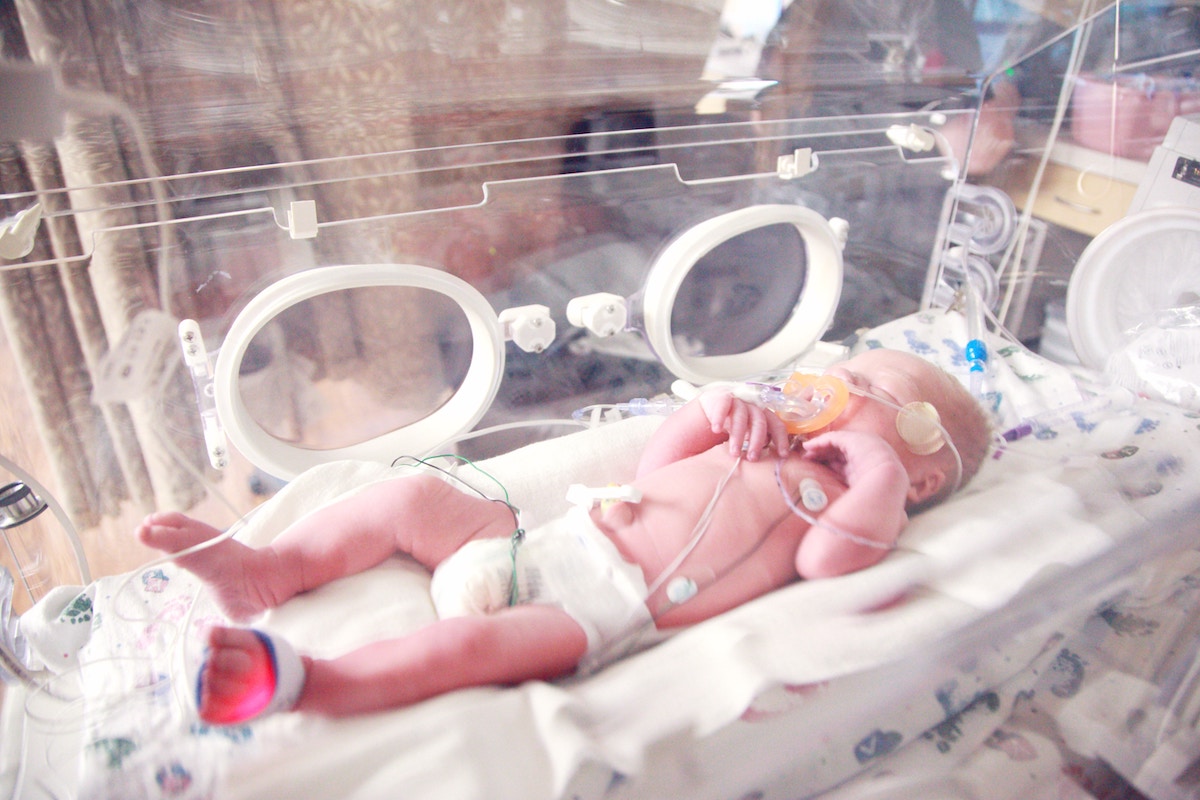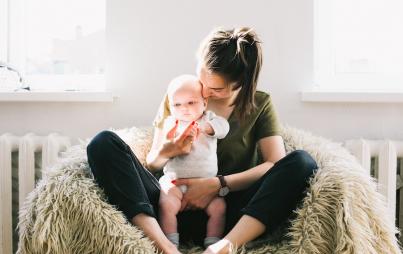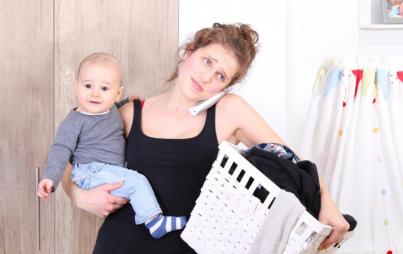
The first time I stepped inside a Neonatal Intensive Care Unit (NICU) was in 2005, during a job interview at the local hospital. If hired, I would be joining the fundraising team that helped secure financial support for the NICU and other hospital departments. My eyes glazed over a bit as my interviewer talked about premature birth and the advanced equipment that helped these tiny patients breathe, eat, and grow. As a newly married twenty-something, I wasn’t ready to have children yet, but I was sure I had little in common with the families whose babies needed such special care.
My interviewer led me to the NICU for an impromptu tour. After scrubbing in at the hand washing station, we entered a warm and dimly lit room that reminded me of a crowded toy store filled with doll-sized cribs. Attached to each crib was a computer screen that periodically emitted various alarms. Around us, infants dozed beneath tangles of thin wires and electrodes. My breath caught in my throat as I peeked gingerly into one crib (called an isolette, I later learned). Its occupant had translucent skin, a soft coat of body hair, and a belly that rose and fell rapidly.
“She’ll be fine,” remarked a nurse, coming up next to me. I tried not to gape as she tinkered with one of the wires and repositioned the baby with skillful ease. This infant was smaller than any baby I had ever seen, and she seemed so fragile, as if she would shatter like glass.
A few days later, I learned that I got the job. But it would take several more years for me to realize that many of my assumptions about prematurity and the NICU were wrong. In recognition of NICU Awareness Month, here is what I learned.
If you haven’t had a child in the NICU, it’s natural to distance yourself emotionally from those who have.
In my job, I often helped with events like the annual radiothon, which benefited the NICU. Over the phone, I interviewed one mother whose baby had received care in our unit. She shared that her child had been delivered early due to preeclampsia, a disorder in which the mother’s blood pressure rises to dangerous levels. Research on the causes of preeclampsia is still ongoing.
Hearing this mother’s experience made me uneasy. She seemed lovely, like someone I would have enjoyed chatting with over a cup of coffee. But empathizing with her felt scary – too close for comfort.
You May Also Like: Postpartum Self-Care
So I convinced myself there was more to this story that I didn’t know. I clung to the mainstream anecdotes I’d heard about premature babies: Their mothers had struggled with addictions, or had serious preexisting health issues, or never received prenatal care. Deep down, I knew the truth: Having a premature baby can happen to anyone. This fact lurked like a shadow in the background, but I wasn’t ready to face it. And I didn’t have to – at least, not just yet.
Babies end up in the NICU for different reasons, many of which are beyond our control.
While my first pregnancy was routine – just as I’d always expected – my second was not. Around 18 weeks, I was diagnosed with an autoimmune disease I’d never heard of: Inflammatory Bowel Disease, which causes the immune system to attack the digestive tract. Within weeks, I became a malnourished shell of my previous self. Because I was pregnant, medication options were limited, and I ended up needing intestinal surgery during my third trimester. A few days later, my daughter arrived, nine weeks early and weighing little more than a small bag of rice.
While some causes of prematurity are preventable, many are not. I exercised, never smoked, and ate reasonably well – save for the occasional chocolate binge. But as I learned, you can do everything right and still be faced with an early delivery for a variety of reasons, from preeclampsia to infections to serious illnesses that make their first appearance during pregnancy. And sometimes there is no identifiable cause for a premature birth. According to Dr. Robert Goldenberg, an obstetrics and gynecology professor at Columbia University, “We don’t really understand why some women go into labor early and why other women don’t.”
Not having a clear reason for a premature birth can rattle you.
After my daughter’s early arrival, I was hell-bent on finding a concrete explanation for why my formerly healthy body had failed my child and me. Had I taken too many antibiotics during childhood? Was it stress, or maybe too much dairy?
Doctors told me that pregnancy and autoimmune diseases can be related, but couldn’t explain why I’d flared so severely and suddenly. I didn’t care what the reason was, so long as it was indisputable, something for me to grasp onto and say, “Aha, so that’s what started this whole crappy cascade of events.”
In the end, my sci-fi enthusiast father had the best explanation. “Maybe a gamma ray just hit you at the wrong time,” he said.
Having a premature birth can mess with your beliefs about health and control. For me, it destroyed a long-held conviction that health problems are largely preventable or at least explainable. This realization can be disorienting. A therapist at the hospital described it fittingly, “You’ve been hit. It’s natural now to feel a bit wobbly out in the world.”
NICU babies may look delicate, but they are resilient.
Thinking back to my first visit to the NICU, what I remember most is how fragile the infants appeared. It wasn’t until my daughter arrived several years later that I realized she wouldn’t break when I held her. Like so many NICU babies, she went through a lot: countless lab tests, poking wires, and the difficult process of learning to eat, breathe, and regulate her temperature as a full-term baby would.
When my daughter finally came home after 41 days in the NICU, at first I felt on edge about her development. I never wanted to let her sleep too long, lest she miss an opportunity to eat and continue gaining weight. I scrutinized her skin between feedings, panicking at one point because I was convinced her face had taken on a bluish tint and indicated a lack of oxygen. (She was fine, but I learned to never again place her against a backdrop of blue bed sheets!) After everything she endured to come home, it took me a while to adjust to the fact that she was healthy – not only healthy, but thriving.
Today my daughter is a happy eight-year-old who loves to sing, dance, and engage in spirited squabbles with her older sister. She’s tougher than I had imagined, and reminds me daily that size has nothing to do with resilience.
Thank you to the doctors, nurses, and techs who work tirelessly to ensure that our babies have the best possible outcomes. I will never forget how you helped my daughter when she needed it most.








